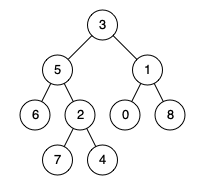Given two nodes of a binary tree p and q, return their lowest common ancestor (LCA).
Each node will have a reference to its parent node. The definition for Node is below:
class Node {
public int val;
public Node left;
public Node right;
public Node parent;
}
According to the definition of LCA on Wikipedia: "The lowest common ancestor of two nodes p and q in a tree T is the lowest node that has both p and q as descendants (where we allow a node to be a descendant of itself)."
Example 1:

Input: root = [3,5,1,6,2,0,8,null,null,7,4], p = 5, q = 1 Output: 3 Explanation: The LCA of nodes 5 and 1 is 3.
Example 2:

Input: root = [3,5,1,6,2,0,8,null,null,7,4], p = 5, q = 4 Output: 5 Explanation: The LCA of nodes 5 and 4 is 5 since a node can be a descendant of itself according to the LCA definition.
Example 3:
Input: root = [1,2], p = 1, q = 2 Output: 1
Constraints:
- The number of nodes in the tree is in the range
[2, 105]. -109 <= Node.val <= 109- All
Node.valare unique. p != qpandqexist in the tree.
/*
// Definition for a Node.
class Node {
public:
int val;
Node* left;
Node* right;
Node* parent;
};
*/
class Solution {
public:
Node* lowestCommonAncestor(Node* p, Node * q) {
unordered_set<Node*> st;
while (st.count(p) == 0) {
if (p == NULL) {
break;
}
st.insert(p);
p = p -> parent;
}
Node *ans = NULL;
while (1) {
if (q == NULL) {
break;
}
if (st.count(q) != 0) {
return q;
} else {
q = q -> parent;
if (q == q -> parent) {
return NULL;
}
}
}
return NULL;
}
};
/*
// Another approach ....
Node* lowestCommonAncestor(Node* p, Node * q) {
// search upwards from p and q, adding each found node to a set
// if the node being added that is reachable from either p or q already exists in the set
// then we have found the lowest common ancestor
std::unordered_set<Node*> parents = {};
Node* s = p;
Node* t = q;
while (s != nullptr || t != nullptr) {
if (s != nullptr) {
if (parents.find(s) != parents.end())
return s;
parents.insert(s);
s = s->parent;
}
if (t != nullptr) {
if (parents.find(t) != parents.end())
return t;
parents.insert(t);
t = t->parent;
}
}
return nullptr;
}
*/
No comments:
Post a Comment